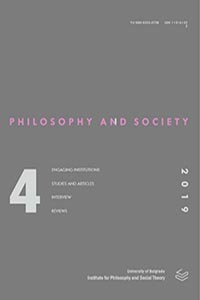Hume’s Theory of Social Constitution of the Self
Hume’s Theory of Social Constitution of the Self
Author(s): Siyaves AzeriSubject(s): Philosophical Traditions
Published by: Institut za filozofiju i društvenu teoriju
Keywords: Hume; consciousness; self; subjectivity
Summary/Abstract: Hume distinguishes between the self of thought and imagination and the self of the passions. He is criticized for contradicting himself as he allegedly attributes fictitiousness to the self in book one of the Treatise but later reintroduces the self in books two and three. Hume’s account of the idea of the self, however, is not contradictory: he shows the impossibility of a pure associationist-empiricist account of the self. Instead, he proposes a social account of the constitution of the idea of the self and consciousness. In doing so, Hume’s account of the self anticipates social-historical theories of the self.
Journal: Filozofija i društvo
- Issue Year: 30/2019
- Issue No: 4
- Page Range: 511-534
- Page Count: 24
- Language: English

